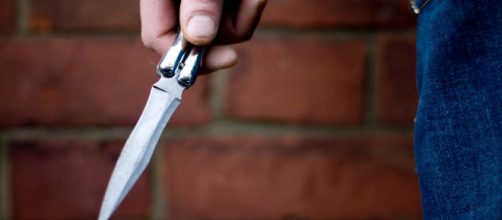Knife related crimes are on the rise all over the UK, where in 2016 one knife crime was committed every 14 minutes. The 40,000 incidents of last year are expected to increase further in 2017. However, fewer cases are being prosecuted by the police. Paul McKenzie, who was stabbed with a machete at 15 years old, was later sent to an institute for carrying a knife and is now an anti-violence campaigner, said that victims often hesitate to report the crimes to the police because they do not want to be involved. The situation in London is particularly concerning: only in 2016, the knife crimes were 13,000 for a total of 61 people who remained killed.
In over one year to June 2017, crimes with a knife in the capital grew by 34%, despite all the efforts of the Met police to face the crisis. Another reason for apprehension is the young age of both the victims and the perpetrators, who are often teenagers. In fact, the average age of moped criminals is only 15, while 40 Londoners under 25 have been stabbed to death only in 2017. Paul McKenzie explains that young people often do not carry a knife with the intention of committing an offence but for either protection or status symbol and they are not aware of the risks associated with having a weapon.
What can be the cause that made London a more dangerous city than New York? First of all, London changed its use of police forces, giving up on the bobbies’ patrols, allegedly to concentrate on more serious crimes.
This is in part due to the terroristic threat that requires more effort from the police forces to prevent it but it has also to do with the cut to the police budget requested by Theresa May when she was Home Secretary. Finally, the increasing bureaucratisation of Scotland Yard that forces too many policemen behind a desk instead of on the streets, where their mere presence act as a deterrent for criminals, is certainly another cause of the upsurge of knife related deaths. Nevertheless, something has been done at the socio-political level to try to put an end to the massacre.
The London Needs You Alive campaign
This initiative was proposed by Sadiq Khan, mayor of London, with the aim to dissuade young Londoners from carrying a knife.
The campaign focused on how valuable its youth is to the city London and urges teenagers to live, for their loved ones as well as to be able to use their talent to accomplish great things.
Carrying a knife won’t keep you safe. Help carry a new message. #LondonNeedsYouAlive #LNYA pic.twitter.com/GkOGJu6ySh
— Mayor of London (@MayorofLondon) November 15, 2017
To spread the message the London mayor involved a group of youth influencers including the Mobo-nominated rapper Yungen, the photographer Tom Sloan, the blogger the Slumflower and the poet Hussain Manawer. With the help of these celebrities' fans, who reposted the campaign’s video on social networks, the initiative had vast resonance. The mayor of London strongly believes in the necessity to educate youth against violence.
He affirmed that police enforcement alone is not enough to prevent knife crimes from happening but it is paramount that young Londoners understand that the risks of carrying a knife are not worth it. He added that these youngsters will be the citizens of the futures and they need to realize their full potential.
The Beyond The Blade project
Thirty-two children and teenagers have been killed in knife attacks this year says the Guardian's project Beyond The Blade, born with the intention to mark each victim’s death. Gary Younge and Damien Gayle are the two journalists exploring the theme of knife Crime in the UK by reporting the statistics, telling the stories of the victims and the perpetrators, and investigating the root cause of this phenomenon.
On the website, you can read about fifteen-years-old Jermaine Goupall, who was talented in math and wanted to become an engineer but was attacked by three men wearing balaclavas and armed with knives and a machete. He died an hour later of a wound in his leg. Quamari Barnes had nothing in common with Jermaine Goupall except he was also fifteen when he was killed with a knife just after he left school in Willesden, north-west London. He loved DJing and favoured “old-school” reggae over grime and rap. Leonne Weeks was instead sixteen when she was found dead on a muddy patch of wasteland not far from her home in Dinnington. Leonne was a trainee beautician and had been repeatedly stabbed by eighteen-years-old Shea Peter Healey, who lived with his parents nearby…


